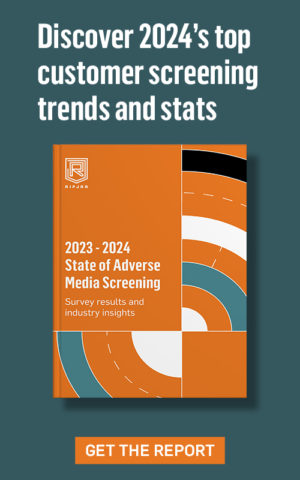The Financial Action Task Force (FATF) held its second Plenary meeting under President T. Raja Kumar in February 2023, with delegates from 206 jurisdictions and observer organisations attending in Paris. Following a turbulent 2022, the FATF Plenary involved the discussion of the world’s most significant financial crime issues, FATF membership changes, and the consequences of the Russian invasion of Ukraine.
FATF anti-money laundering (AML) and counter-financing of terrorism (CFT) standards must be implemented in the domestic legislation of member states. In order to help your firm remain compliant with the new rules and regulations, let’s take a closer look at the key outcomes and points of interest from the FATF Plenary.
Russia FATF Membership
Following the Plenary, the FATF released a statement on the Russian Federation’s “illegal, unprovoked and unjustified full-scale military invasion of Ukraine”. In addition to expressing sympathy for the Ukrainian people following the “huge loss of lives and malicious destruction”, the FATF noted that the actions of President Vladimir Putin’s regime posed a threat to the “security, safety, and integrity of the global financial system”.
Accordingly, the FATF noted that it was suspending the Russian Federation’s FATF membership. With the suspension in place, the FATF added that Russia would be expected to continue to meet its AML/CFT obligations and that it would remain a member of the Eurasian Group on Combating Money Laundering (EAG). The FATF suggested that it would monitor the ongoing situation in Ukraine with a view to lifting or modifying Russia’s suspension at subsequent Plenary meetings.
Changes to the FATF Black List and Grey List
The FATF’s list of High Risk Jurisdictions subject to a Call for Action, also known as the FATF black list, designates countries that have serious deficiencies in their AML/CFT regulatory frameworks. Black list countries pose an extremely high risk of financial crime and the FATF calls for the deployment of “counter-measures” when dealing with them.
As of the Plenary session in February 2023, there were three countries on the FATF black list:
- Democratic People’s Republic of Korea (unchanged since February 2020)
- Iran (unchanged since February 2020)
- Myanmar (added October 2022)
The FATF’s Jurisdictions Under Increased Monitoring, also known as the grey list, is a list of high risk countries that have “strategic deficiencies” in their AML/CFT infrastructure but that have committed to an action plan in order to resolve them.
The following countries were added to the grey list at the Plenary:
- South Africa: South Africa was added to the grey list as a result of its failure to address concerns raised in its 2021 Mutual Evaluation Report (MER). These included inadequate customer due diligence measures, and a lack of AML/CFT resources for compliance employees and law enforcement agencies.
- Nigeria: Nigeria’s grey list action plan sets out a series of regulatory requirements, including improvements to the country’s national AML/CFT strategy, improvements to risk-based AML/CFT supervision, and more effective investigations of money laundering and terrorism financing activities.
The FATF also announced that two countries, Cambodia and Morocco, would be removed from the grey list, following their progress in addressing “technical deficiencies” outlined in their individual action plans.
Beneficial Ownership Revisions
The FATF emphasised beneficial ownership as a priority in 2023 and beyond, building on details set out in its 2021-22 Annual Report. The report outlined the need for greater transparency around the “ultimate ownership and control of legal persons” in order to prevent criminals using corporate structures “to hide their identity and launder their illicit profits from criminal activities”. Accordingly, in March 2022, the FATF implemented amendments to its Recommendation 24, with a requirement for a “multi-pronged approach” to collecting beneficial ownership information.
The 2023 Plenary clarified the guidance set out in the Annual Report, with the publication of a document to help countries implement the amended Recommendation 24. The guidance sets out a requirement for countries to establish a domestic beneficial ownership registry, along with a public body to provide supervision. The Plenary also agreed to enhance Recommendation 25 in order to bring legal arrangements into alignment with the beneficial ownership standards set out in Recommendation 24. The FATF will prepare a new guidance document on the revised Recommendation 25.
Ransomware Research
The Plenary recognised the significant increase in “the scale and number of ransomware attacks” in recent years, and the “crippling impact” that they have on businesses around the world. Given the nature of the global ransomware threat, the Plenary emphasised the need to “build on and leverage existing international cooperation mechanisms”, and for authorities to develop the necessary skillets to identify and trace virtual assets involved in ransomware attacks.
The FATF has conducted research into the methodology of ransomware attacks and how criminals launder their financial proceeds, with a report on the research published in March 2023.
Virtual Asset Regulations Implementation
The FATF has noted that “the lack of regulation of virtual assets” in jurisdictions around the world has created opportunities for both money launderers and terrorist financiers. In 2018, the FATF strengthened Recommendation 15, also known as the Travel Rule, to include virtual assets and virtual asset service providers. The Travel Rule requires firms to obtain identifying information about the originators and beneficiaries of virtual asset transactions, and to retain that data for AML/CFT purposes.
The 2023 Plenary agreed to strengthen AML/CFT provisions for virtual assets and virtual asset service providers, with the introduction of a roadmap for the implementation of regulations. The roadmap steps include a review of current regulatory implementations across the FATF global network, and a progress report to be published in 2024 on members’ progress in implementing new regulations.
How Technology Can Help FATF Compliance
FATF members are required to implement FATF Recommendations in domestic legislation, which means that firms must be agile in their AML/CFT response to recent amendments. The changes announced at the Plenary, for example, require firms to conduct enhanced due diligence for customers from South Africa, Nigeria, and Russia (which is also subject to a range of international economic sanctions), and review their beneficial ownership and virtual asset AML/CFT screening capabilities.
The global scope of FATF Plenary guidance means that firms must adjust their data collection and analysis process to capture new risks, and be able to remediate AML/CFT alerts quickly and efficiently. Ripjar’s Labyrinth Screening platform enables exactly this kind of compliance response, with real time risk screening across thousands of international data sources, including adverse media, sanctions lists, and watchlists. Blending structured and unstructured data seamlessly, in over 20 foreign languages, Labyrinth Screening brings enterprise-wide coherence to the screening process, and ensures your organisation reacts as swiftly as possible following the emergence of new regulatory standards or criminal threats.









